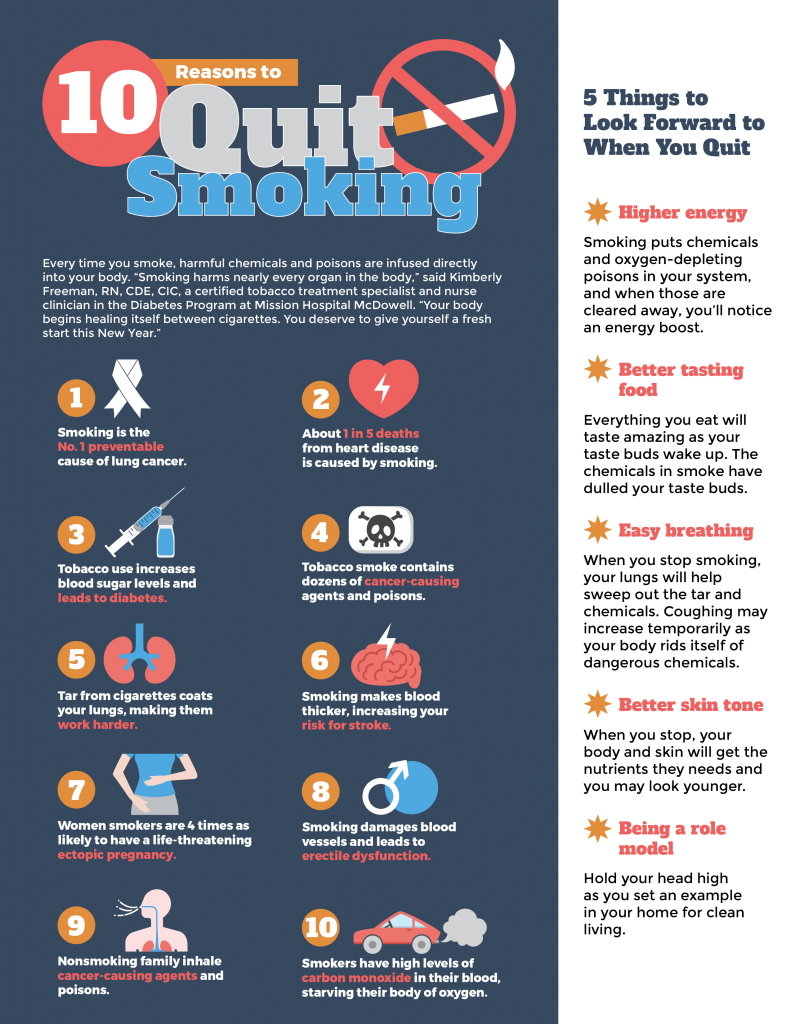
If you’re eager to quit smoking and are looking for effective methods to kick the habit, you’ve come to the right place. This article will provide you with valuable insights and practical tips on how to bid farewell to cigarettes for good. Whether you’ve been smoking for years or just recently developed the habit, the road to quitting may seem challenging. However, armed with determination and the right tools, you can overcome this addiction and embark on a healthier, smoke-free lifestyle.
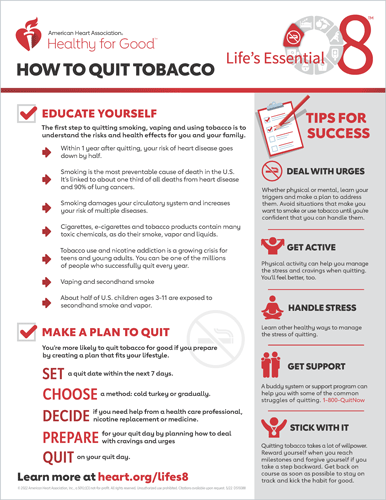
This image is property of www.heart.org.
Choosing to Quit
Understanding the risks of smoking
If you’re considering quitting smoking, it’s important to understand the risks associated with this habit. Smoking has been linked to numerous health issues, including an increased risk of lung cancer, heart disease, stroke, and respiratory problems. It can also cause damage to your skin, teeth, and gums. By quitting smoking, you can significantly reduce your risk of developing these conditions and improve your overall health.
Finding motivation to quit
Finding the motivation to quit smoking can be a key aspect of your journey. Take some time to reflect on the reasons why you want to quit. These could include wanting to improve your health, setting a positive example for your loved ones, or saving money. Write down your motivations and refer to them whenever you need a reminder of why you’re quitting. Having a strong sense of purpose can greatly increase your chances of successfully quitting.
Setting a quit date
Setting a quit date can help you mentally prepare for the journey ahead. Choose a date that works well for you and mark it on your calendar. This provides a clear goal to work towards and allows you to plan accordingly. It’s important to choose a date that gives you enough time to adequately prepare and gather the support you need. Remember, quitting smoking is a process, and setting a quit date is a crucial step in that process.
Preparing to Quit
Identifying triggers and developing coping strategies
Identifying the triggers that make you reach for a cigarette is an essential part of preparing to quit. These triggers can be different for everyone and may include situations, emotions, or social gatherings. Once you’ve identified your triggers, it’s important to develop healthy coping strategies to deal with them. This could involve deep breathing exercises, engaging in physical activity, or finding alternative ways to manage stress or boredom.
Creating a support network
Quitting smoking can be challenging, but having a support network can greatly increase your chances of success. Reach out to your friends, family, and loved ones and let them know about your decision to quit. Their support, encouragement, and understanding can be a powerful source of motivation throughout your journey. Additionally, consider joining a support group or seeking professional help. Remember, you don’t have to do this alone – there are resources available to assist you.
Considering nicotine replacement therapy (NRT)
Nicotine replacement therapy (NRT) can be a valuable tool when quitting smoking. NRT works by providing a controlled dose of nicotine to help reduce withdrawal symptoms and cravings. It comes in various forms such as patches, gum, inhalers, or lozenges. Consult with a healthcare professional to determine which form of NRT may be most suitable for you based on your smoking habits and preferences.
Exploring prescription medications
In addition to NRT, there are prescription medications available that can aid in quitting smoking. These medications work by blocking the nicotine receptors in the brain, reducing the pleasurable effects of smoking. Talk to your healthcare professional about the different options available and determine if prescription medication is a suitable choice for you. It’s important to understand the potential side effects and risks associated with these medications and follow the prescribed dosage and guidelines.
Talking to a healthcare professional
Seeking guidance from a healthcare professional is an important step in your journey to quit smoking. They can provide personalized advice, help you explore different options, and monitor your progress. A healthcare professional can also connect you with counseling or therapy services to address any psychological or emotional aspects of quitting. Regular check-ups and follow-ups are essential to ensure you stay on track and receive the support you need.
Making Lifestyle Changes
Eating a healthy diet
When quitting smoking, it’s essential to focus on maintaining a healthy diet. Opt for nutritious foods that can help support your overall health and wellbeing. Include plenty of fruits, vegetables, whole grains, and lean proteins in your meals. Avoid or moderate your intake of sugary and fatty foods, as they can lead to weight gain. Stay hydrated by drinking plenty of water throughout the day.
Staying physically active
Regular physical activity not only helps improve your overall health but can also serve as a healthy distraction from cravings. Find activities that you enjoy, whether it’s going for a walk, biking, dancing, or joining a fitness class. Aim for at least 150 minutes of moderate-intensity exercise per week. Remember, staying active can boost your mood, reduce stress, and increase your energy levels.
Getting enough sleep
Proper sleep is crucial for your overall health and can also support your efforts to quit smoking. Create a relaxing bedtime routine and ensure you’re getting enough hours of quality sleep each night. Avoid nicotine, caffeine, and electronic screens before bed, as they can interfere with sleep quality. Quality rest can help you manage cravings, reduce irritability, and improve your overall wellbeing.
Managing stress
Quitting smoking can be stressful, so developing healthy stress management techniques is essential. Explore stress-reducing activities such as deep breathing exercises, yoga, meditation, or spending time in nature. Find what works best for you and incorporate these practices into your daily routine. By effectively managing stress, you’ll be better equipped to navigate the challenges of quitting smoking.
Utilizing Behavioral Techniques
Avoiding situations associated with smoking
One effective strategy for quitting smoking is to avoid situations that trigger your cravings. Identify the places, people, or activities that you associate with smoking and try to avoid them, especially during the initial phases of quitting. This may involve making changes to your routine, avoiding social gatherings where smoking occurs, or finding alternative routes to avoid the places where you used to smoke.
Substituting smoking with healthier habits
Replacing smoking with healthier habits can help alleviate cravings and provide a positive outlet for your energy. Consider engaging in activities such as chewing sugar-free gum, drinking water, or snacking on healthy snacks like carrot sticks or nuts when cravings strike. Finding activities that distract your mind and keep your hands occupied can aid in breaking the habit of reaching for a cigarette.
Rewarding yourself for milestones
As you progress on your journey to quit smoking, it’s important to celebrate your milestones and achievements. Set small goals along the way and reward yourself when you reach them. Treat yourself to something enjoyable, like a day at the spa, a movie night, or a new book. These rewards not only serve as motivation but also reinforce the positive changes you’re making.
Using visualization and affirmations
Visualization and affirmations can be powerful tools in your journey to quit smoking. Take a few moments each day to visualize yourself as a non-smoker, breathing in fresh air and feeling proud of your accomplishment. Repeat affirmations to yourself, such as “I am strong and capable of quitting smoking.” By visualizing and affirming your success, you’ll strengthen your belief in yourself and your ability to quit.
Finding distractions or engaging in hobbies
Finding distractions or engaging in hobbies can be an effective way to shift your focus away from smoking. Explore activities that you enjoy, whether it’s reading, painting, gardening, playing a musical instrument, or practicing a sport. By filling your time with fulfilling and engaging hobbies, you’ll not only distract yourself from cravings but also discover new interests and passions.
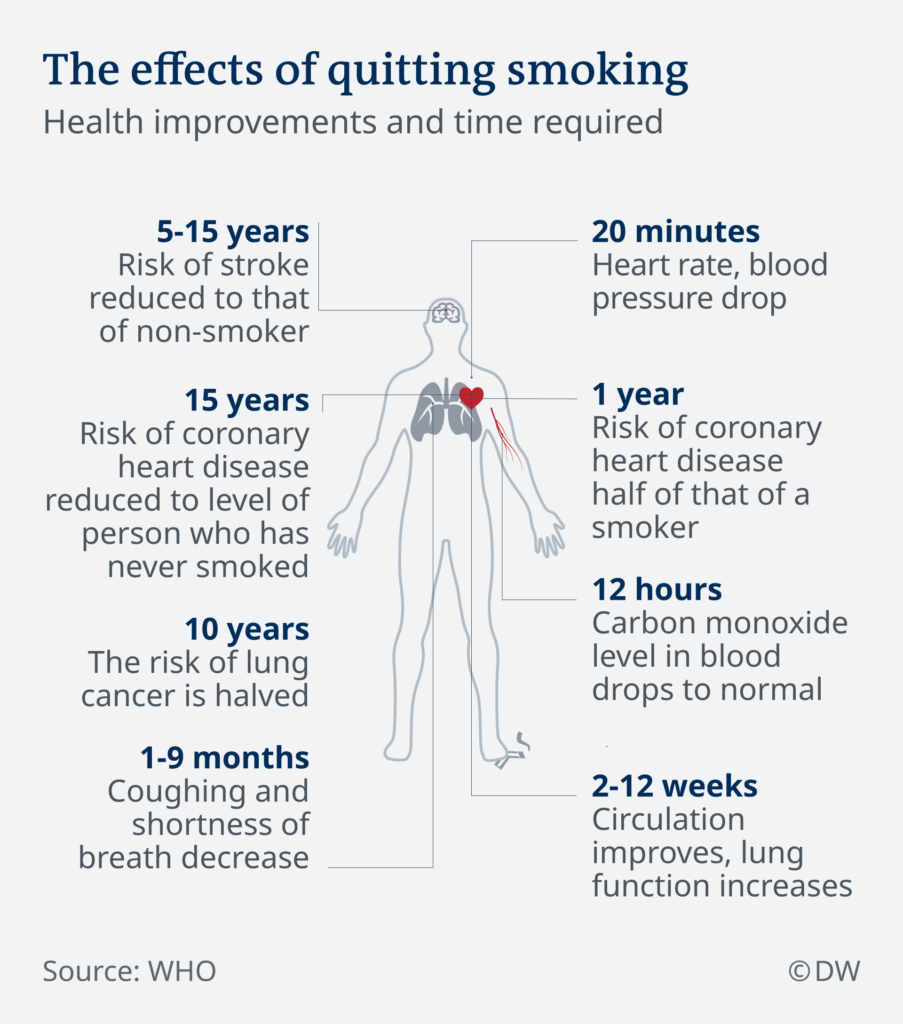
This image is property of static.dw.com.
Nicotine Replacement Therapy (NRT)
Understanding different forms of NRT (patch, gum, inhaler, etc.)
Nicotine replacement therapy (NRT) provides a way to gradually reduce nicotine dependence while reducing withdrawal symptoms. NRT is available in various forms, including patches, gum, inhalers, lozenges, and nasal sprays. Each form delivers nicotine into your system in a controlled manner, helping to alleviate cravings and manage withdrawal symptoms. Understanding the different forms can help you choose the most suitable option for your needs.
Choosing the right type of NRT for you
Selecting the right type of NRT is essential to maximize its effectiveness. Consider factors such as your smoking habits, preferences, and any underlying medical conditions. For example, if you smoke heavily or have a strong oral fixation, nicotine gum or lozenges may be more suitable. If you prefer a discreet option, patches or inhalers might be a better choice. Consult with a healthcare professional to determine the best fit for you.
Following proper usage guidelines
To make the most of NRT, it’s important to follow the proper usage guidelines. Read the instructions carefully and use the product as directed. Some forms of NRT, such as patches, need to be applied daily, while others, like gum or lozenges, can be used as needed. Be sure to understand the recommended dosage and timing for each form of NRT to effectively manage cravings and withdrawal symptoms.
Managing withdrawal symptoms
While NRT can help manage withdrawal symptoms, it’s important to be aware that some discomfort may still occur. Common withdrawal symptoms include cravings, irritability, restlessness, difficulty concentrating, and disturbed sleep. Remember that these symptoms are temporary and will gradually decrease over time. If you experience severe or persistent symptoms, consult with a healthcare professional for further support and guidance.
Knowing when to seek professional help
While NRT can be beneficial for many individuals, some may require additional support. If you find that NRT alone is not sufficient to help you quit smoking, or if you’re experiencing severe withdrawal symptoms or negative side effects, it may be time to seek professional help. A healthcare professional can assess your situation and provide alternative strategies or medications to assist you in your journey to quit smoking.
Exploring Prescription Medications
Discussing options with a healthcare professional
Prescription medications can be a valuable tool in helping you quit smoking. Discuss your options with a healthcare professional who specializes in smoking cessation. They can provide guidance and prescribe medications that may be suitable for you based on your medical history, lifestyle, and smoking habits. It’s important to have an open and honest conversation with your healthcare professional to determine the best course of action.
Understanding different prescription medications
There are different prescription medications available for smoking cessation. Two commonly prescribed medications are bupropion and varenicline. Bupropion is an antidepressant that can help reduce nicotine cravings and withdrawal symptoms. Varenicline is a medication that blocks the nicotine receptors in the brain, reducing the pleasurable effects of smoking. Your healthcare professional will explain the potential benefits, risks, and side effects of each medication in detail.
Knowing potential side effects and risks
Like all medications, prescription medications for smoking cessation come with potential side effects and risks. Common side effects may include nausea, headaches, insomnia, or changes in mood. It’s essential to be aware of these potential side effects and report any concerns or adverse reactions to your healthcare professional. They can provide guidance on managing side effects and adjust your dosage if necessary.
Following prescribed dosage and guidelines
Follow your healthcare professional’s prescribed dosage and guidelines for any medication you’re using to aid in smoking cessation. It’s crucial to adhere to the recommended dosage to achieve the desired benefits without compromising your health. If you have any questions or concerns about your medication, don’t hesitate to reach out to your healthcare professional for clarification or adjustments.
Monitoring progress and seeking support
As you begin taking a prescription medication for smoking cessation, it’s important to monitor your progress and seek support when needed. Keep track of any changes you experience, both positive and negative, and discuss them with your healthcare professional during check-ups or follow-up appointments. Regular communication with your healthcare professional will ensure that you’re receiving the appropriate support and guidance throughout your journey.
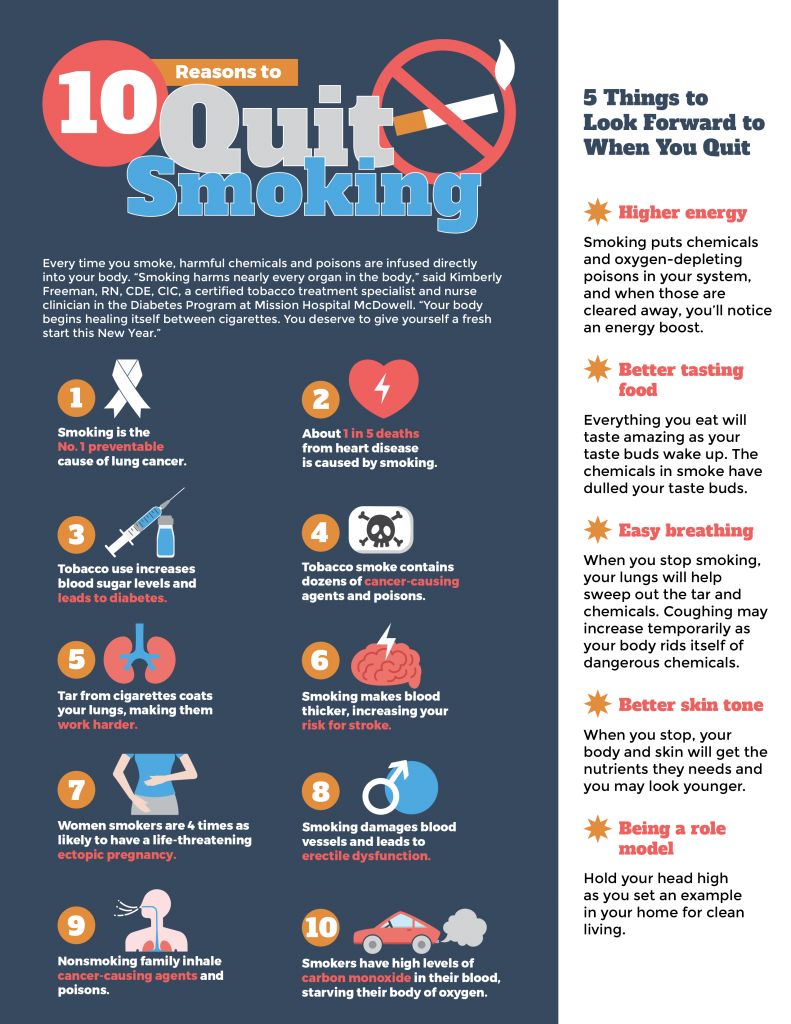
This image is property of blog.mission-health.org.
Support from Healthcare Professionals
Benefits of seeking professional help
Seeking professional help when quitting smoking can provide numerous benefits. Healthcare professionals who specialize in smoking cessation can offer expert guidance, personalized advice, and tailored treatment plans. They can help you navigate through obstacles, monitor your progress, and make adjustments as needed. With their support, you’ll have access to a comprehensive range of resources and strategies to enhance your chances of successfully quitting smoking.
Finding a healthcare professional experienced in smoking cessation
When seeking professional help for smoking cessation, it’s important to find a healthcare professional who specializes in this field. Look for professionals who have experience and expertise in helping individuals quit smoking. They will have a thorough understanding of the challenges and strategies associated with quitting and can provide the most relevant and effective guidance for your unique situation.
Types of counseling or therapy available
Counseling or therapy can play a crucial role in your journey to quit smoking. Different types of counseling are available to address the psychological and emotional aspects of quitting. Behavioral counseling helps individuals identify triggers, develop coping strategies, and replace smoking habits with healthier ones. Cognitive-behavioral therapy (CBT) focuses on changing thought patterns and behaviors associated with smoking. Motivational counseling provides support and encouragement to help individuals stay motivated and committed to quitting.
Creating a personalized quit plan
A personalized quit plan is an important tool for success when quitting smoking. With the assistance of a healthcare professional, create a plan that outlines your goals, strategies, and timeline for quitting. This plan will take into consideration your individual needs, preferences, and any underlying health conditions. It serves as a roadmap to guide you through the quitting process and offers structure and guidelines to follow.
Regular check-ups and follow-ups
Regular check-ups and follow-ups with your healthcare professional are essential throughout your journey to quit smoking. These appointments allow for monitoring of your progress and provide an opportunity to address any concerns, questions, or challenges you may be experiencing. Regular communication with your healthcare professional ensures that you receive ongoing support and can make adjustments to your quit plan as needed.
Joining Support Groups
Understanding the importance of support groups
Support groups can be a valuable source of encouragement, guidance, and understanding when quitting smoking. They provide a safe space where individuals with similar goals and experiences can come together to share their challenges and successes. Being surrounded by others who understand what you’re going through can provide a sense of community and motivation to stay committed to quitting.
Finding local or online support groups
There are numerous support groups available, both locally and online, for those looking to quit smoking. Local support groups often meet in person, providing an opportunity to connect with others face-to-face. Online support groups allow for flexibility and accessibility, enabling you to engage with a community of individuals dedicated to quitting smoking from the comfort of your own home. Research local resources or explore online platforms to find support groups that suit your needs.
Sharing experiences and learning from others
Support groups provide a valuable platform for sharing experiences and learning from others. Within the group, you can discuss challenges, strategies, and success stories, gaining insights and inspiration from people who have successfully quit smoking or are working towards the same goal. By sharing your experiences and hearing from others, you’ll realize that you’re not alone in your journey and can draw strength and motivation from the collective support.
Accountability and encouragement within the group
Accountability and encouragement are two key benefits of joining a support group. Being surrounded by individuals who share a common goal allows for a sense of accountability to yourself and others. The group can hold each other accountable, inspiring participants to stay committed to quitting and providing support during challenging times. The encouragement you receive within the group can be a powerful motivator on your path to becoming smoke-free.
Attending meetings and actively participating
To fully benefit from a support group, it’s important to actively participate and attend meetings regularly. Engage in discussions, ask questions, and share your experiences. Actively listening to others can provide valuable insights and perspectives. By attending meetings consistently and actively participating, you’ll build connections, gain support, and create a sense of accountability that contributes to your overall success in quitting smoking.
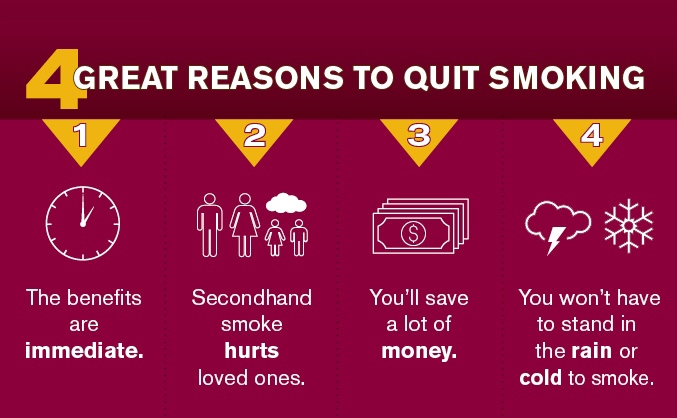
This image is property of www.loyolamedicine.org.
Dealing with Relapses
Recognizing common triggers for relapse
Relapses are a common part of the quitting process, and it’s important to recognize potential triggers that may lead to a relapse. These triggers can include stress, social situations, alcohol consumption, or simply being in the presence of others who are smoking. By identifying your triggers, you can proactively develop strategies to avoid or cope with them effectively.
Identifying early warning signs
Recognizing early warning signs that you may be heading towards a relapse is crucial in preventing one from occurring. These signs may include increased cravings, thoughts of smoking, or a decline in motivation. Pay attention to these warning signs and address them promptly with coping strategies, support from your network, or professional help if needed. By taking action early on, you can prevent a relapse from derailing your progress.
Implementing strategies to prevent relapse
Developing strategies to prevent relapse is an essential part of your quit plan. These strategies can include avoiding triggers, engaging in healthier habits, seeking support when needed, utilizing stress management techniques, and having a plan in place for challenging situations. By implementing these strategies, you’ll be prepared to navigate potential obstacles and remain committed to your goal of quitting smoking.
Seeking support immediately after a relapse
In the unfortunate event of a relapse, it’s important to seek support immediately. Reach out to your support network, whether it’s friends, family, or fellow support group members, and let them know what has happened. Their understanding, encouragement, and guidance can help you get back on track and regain your focus. Remember, a relapse doesn’t mean failure – it’s an opportunity to reassess your approach and learn from the experience.
Learning from relapses and adjusting your approach
Relapses can provide valuable insights into your quitting journey. Take the time to reflect on what led to the relapse and identify any patterns or triggers. Learning from these experiences allows you to adjust your approach and strengthen your strategies for quitting smoking. Remember that quitting smoking is a process, and setbacks along the way can be learning opportunities that ultimately contribute to your success.
Benefits of Quitting Smoking
Improvements in overall health
Quitting smoking can have a profound positive impact on your overall health. From the moment you quit, your body starts to heal and repair. The risk of developing smoking-related diseases decreases over time, and many health conditions can be significantly improved or prevented altogether. Enjoying better lung function, improved cardiovascular health, increased energy levels, and a boosted immune system are just some of the benefits you can experience as a non-smoker.
Reduced risk of chronic diseases
Smoking is a major risk factor for chronic diseases such as lung cancer, heart disease, stroke, and chronic obstructive pulmonary disease (COPD). By quitting smoking, you significantly reduce your risk of developing these conditions. Increased life expectancy and a higher quality of life are important outcomes of reducing your risk of chronic diseases through smoking cessation.
Enhanced sense of taste and smell
One of the notable benefits of quitting smoking is an enhanced sense of taste and smell. Smoking can dull your senses, making it harder to fully appreciate the flavors and aromas of food and drink. When you quit, your taste buds and olfactory senses begin to regenerate, allowing you to fully enjoy the subtleties and richness of different tastes and smells.
Improved breathing and lung function
Smoking damages your lungs and can lead to conditions such as chronic bronchitis and emphysema. However, when you quit smoking, your lungs start to repair themselves. You may notice improvements in your breathing, less coughing, and a decrease in respiratory symptoms. Over time, your lung function improves, allowing you to engage in physical activities with greater ease and endurance.
Saving money and improving finances
Quitting smoking not only benefits your health but also your finances. Smoking can be an expensive habit, with the cost of cigarettes continuously increasing. By quitting, you can save a significant amount of money over time. Calculate how much you spend on cigarettes each week, month, and year, and visualize how those savings can be put towards other meaningful things in your life, such as travel, hobbies, or financial security.
Quitting smoking is a significant decision that requires commitment and dedication. By understanding the risks of smoking, finding motivation, and setting a quit date, you are taking the first steps towards a healthier and smoke-free life. Preparing to quit involves identifying triggers, developing coping strategies, creating a support network, and considering the use of nicotine replacement therapy or prescription medications. Making lifestyle changes, utilizing behavioral techniques, and seeking support from healthcare professionals can greatly enhance your chances of success. Joining support groups, dealing with relapses, and embracing the numerous benefits of quitting smoking are all important aspects of your quitting journey. Remember, quitting smoking is a process, and each step you take brings you closer to a healthier and smoke-free future.
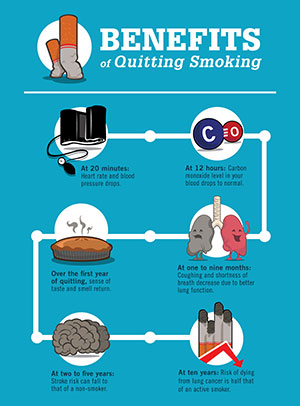
This image is property of www.froedtert.com.